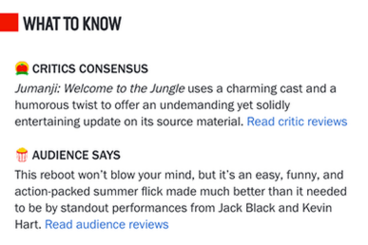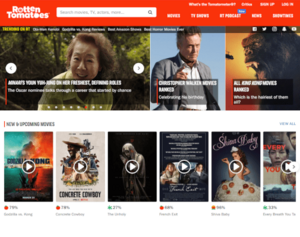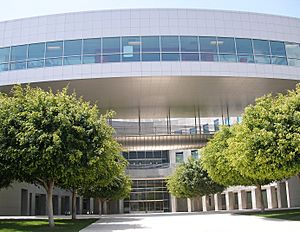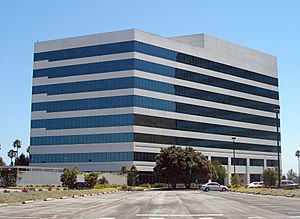Rotten Tomatoes facts for kids
 |
|
|
Type of site
|
Film and television review aggregator and user community |
|---|---|
| Country of origin | United States |
| Owner |
|
| Founder(s) | Senh Duong |
| Key people | Senh Duong Patrick Y. Lee Stephen Wang |
| Parent | Fandango Media |
| Commercial | Yes |
| Registration | Optional |
| Launched | August 12, 1998 |
| OCLC number | 48768329 |
Rotten Tomatoes is a popular American website that collects and shows reviews for movies and TV shows. It helps people decide what to watch by giving a quick idea of how critics and audiences feel about a film or show.
The website was started in August 1998 by three college students: Senh Duong, Patrick Y. Lee, and Stephen Wang. The name "Rotten Tomatoes" comes from the old idea of audiences throwing rotten tomatoes at a bad stage performance. However, the founders were actually inspired by a scene in the 1992 movie Léolo.
Since 2010, Rotten Tomatoes has changed owners a few times. It is now owned mostly by Comcast's Fandango company, with Warner Bros. Discovery owning a smaller part. Many moviegoers check Rotten Tomatoes before deciding to see a film.
Contents
History of Rotten Tomatoes
How Rotten Tomatoes Started
Rotten Tomatoes began on August 12, 1998, as a side project by Senh Duong. He wanted to create a website where people could easily find reviews from many different critics in the United States.
Duong was a big fan of Jackie Chan movies. He was inspired to create the site after collecting all the reviews for Chan's Hong Kong action movies that were being released in the U.S. The idea really took off when he was waiting for Rush Hour (1998), Jackie Chan's first big Hollywood movie.
Duong built the website in just two weeks. It went live in August 1998. Even though Rush Hour was delayed, Duong started adding reviews for other movies too. The first non-Jackie Chan movie reviewed on the site was Your Friends & Neighbors (1998). The website quickly became popular, getting mentions from big names like Netscape and Yahoo! in its first week.
Growing and Changing Owners
Senh Duong soon teamed up with his college friends, Patrick Y. Lee and Stephen Wang. They officially launched Rotten Tomatoes as a full-time business on April 1, 2000.
In June 2004, a company called IGN Entertainment bought Rotten Tomatoes. Then, in September 2005, IGN itself was bought by News Corp. Later, in January 2010, IGN sold Rotten Tomatoes to Flixster.
In 2011, Warner Bros. bought Flixster, which included Rotten Tomatoes. Then, in February 2016, Rotten Tomatoes and Flixster were sold again to Comcast's Fandango. Warner Bros. still kept a small share in the companies. In December 2016, Fandango and its websites, including Rotten Tomatoes, moved to new offices in Beverly Hills, California.
In March 2018, Rotten Tomatoes updated its design, icons, and logo for the first time in 19 years. In May 2020, the website won a Webby People's Voice Award for Entertainment.
In February 2021, Rotten Tomatoes made some design changes to its website. They added the release year, genre, and movie length to the "Score Box" at the top of each film page. They also added a new "What to Know" section. This section combines summaries of both critic and audience opinions.
How Rotten Tomatoes Works
Critics' Scores: The Tomatometer
Rotten Tomatoes collects reviews from professional writers who are approved film critics. These critics upload their reviews to the movie's page on the website. They mark their review as "fresh" if they liked the movie or "rotten" if they didn't. This is important because some reviews don't use a number score.
The website then calculates the percentage of positive reviews. This is called the "Tomatometer" score.
- If 60% or more of the reviews are positive, the film is considered "fresh".
- If less than 60% of the reviews are positive, the film is considered "rotten".
The site also calculates an average score out of 10. A short part of each review is shown, and you can click on it to read the full review.
Some critics are called "Top Critics" because they write for major newspapers. Their opinions are also included in the overall score. When there are enough reviews, the Rotten Tomatoes staff writes a "Critics Consensus." This is a short summary of what most critics thought about the movie.
The "Certified Fresh" seal is a special award for highly-rated movies.
- A movie needs a Tomatometer score of 75% or higher.
- It must have at least 80 reviews (or 40 for movies released in fewer theaters) from approved critics, including 5 "Top Critics."
- Once a film is "Certified Fresh," it usually keeps this status unless its score drops below 70%.
To show a Tomatometer score, a movie needs a certain number of critic reviews. This number depends on how much money the movie is expected to make. For example, big movies need 40 reviews, while smaller movies might only need 10.
Golden Tomato Awards
Since 2000, Rotten Tomatoes has given out the Golden Tomato Awards. These awards honor the best-reviewed films of the year based on the website's rating system. There isn't a fancy ceremony, but the winners are announced on the website.
Movies are divided into categories like "wide release" (shown in many theaters) and "limited release" (shown in fewer theaters). There are also categories for British and Australian films. The "User" category is for the highest-rated film by regular users. The "Mouldy" award is for the worst-reviewed films of the year.
Audience Scores: The Popcornmeter
Rotten Tomatoes also has an "audience score," called the "Popcornmeter." This score shows what regular movie watchers think. It calculates the percentage of registered users who rated a film positively on a 5-star scale.
To show a Popcornmeter score, a movie needs a certain number of audience reviews. This number depends on how much money the movie is expected to make. For example, big movies need 500 audience reviews, while smaller movies might need 50.
On May 24, 2019, Rotten Tomatoes started a "verified rating system." Now, users need to prove they bought a ticket to the movie (usually through Fandango) for their review to count towards the main audience score. Users can still leave reviews without verifying, but those reviews won't affect the Popcornmeter.
On August 21, 2024, Rotten Tomatoes introduced a new "Verified Hot" badge for audience scores. This badge is given to films that have an audience score of 90% or higher from users who have verified their ticket purchase.
What People Think: "What to Know"

In February 2021, Rotten Tomatoes added a "What to Know" section to each movie page. This section combines two short summaries: the "Critics Consensus" and a new "Audience Says" blurb. It gives users a quick overview of what both critics and regular viewers think about a movie.
"Critics Consensus" / "Audience Says"
The "Critics Consensus" is a brief summary of what professional critics generally thought about a movie. It helps explain why a movie got its Tomatometer score.
In February 2021, Rotten Tomatoes added the "Audience Says" section. This is similar to the "Critics Consensus," but it summarizes the reviews from registered users. The Rotten Tomatoes team said they might also mention any outside issues or controversies that affected how audiences felt about a film.
Other Features
Rotten Tomatoes used to have different versions of its website for countries like the United Kingdom, India, and Australia. These were stopped when Fandango bought the company. However, the Mexican version of the site, Tomatazos, is still active.
Rotten Tomatoes also has an API. This is a special tool that lets other websites use Rotten Tomatoes data, like critic and audience ratings.
How Rotten Tomatoes Influences Movies
Does it Affect Movie Success?
Some big Hollywood movie studios have worried that Rotten Tomatoes could hurt their movies. In 2017, some big movies that were expected to do well, like Pirates of the Caribbean: Dead Men Tell No Tales and The Mummy, got low scores on Rotten Tomatoes. They ended up making less money than expected. People wondered if the low Rotten Tomatoes scores were to blame.
On the other hand, movies like Wonder Woman and Spider-Man: Homecoming got high scores (both 92%). These movies did very well at the box office, meeting or even beating expectations.
A study in 2015 found that Rotten Tomatoes, along with social media, would become more important for the movie business. Many young people check the internet for reviews before buying things, including movie tickets.
However, some people argue that if a movie gets a bad score on Rotten Tomatoes, it's the filmmakers' fault for making a poor movie, not the website's. As one movie executive said, "To me, it's a ridiculous argument that Rotten Tomatoes is the problem... make a good movie!"
Some studios have tried to delay or cancel early screenings for critics if they think a movie might get bad reviews. The idea is to prevent low scores from hurting ticket sales before the movie comes out. For example, Sony delayed critic reviews for The Emoji Movie in 2017. The movie still got a very low score (9%) but made a decent amount of money. However, this tactic can sometimes backfire, making people think the movie is bad even before they see reviews.
Dealing with Fake Reviews
On February 26, 2019, Rotten Tomatoes made a change to stop "review bombing." This is when many users leave negative reviews for a movie before it's even released, often because of a controversy not related to the movie itself. To prevent this, the site stopped accepting user reviews until a film was publicly released. They also added a system for "verified" reviews, where users have to prove they bought a ticket.
Even with these discussions, academic studies so far haven't found strong proof that Rotten Tomatoes ratings directly affect how much money a movie makes. However, in April 2024, The Hollywood Reporter reported that movie directors' past Rotten Tomatoes scores are now often mentioned in meetings when they try to get new jobs. This shows how important the scores have become in the film industry.
See also
 In Spanish: Rotten Tomatoes para niños
In Spanish: Rotten Tomatoes para niños
- Metacritic
- Internet Movie Database (IMDb)
- List of films with a 0% rating on Rotten Tomatoes
- List of films with a 100% rating on Rotten Tomatoes
- "Splatty Tomato"
 | Claudette Colvin |
 | Myrlie Evers-Williams |
 | Alberta Odell Jones |




